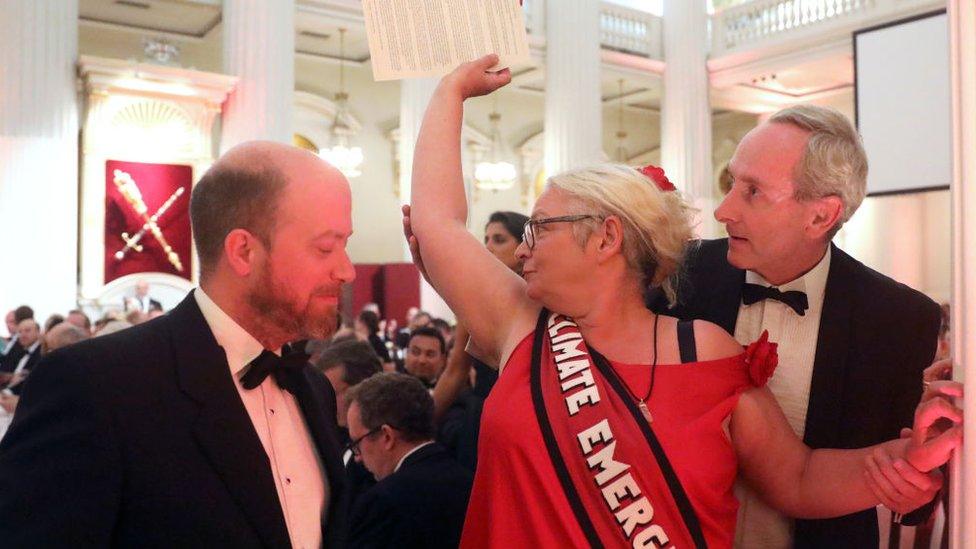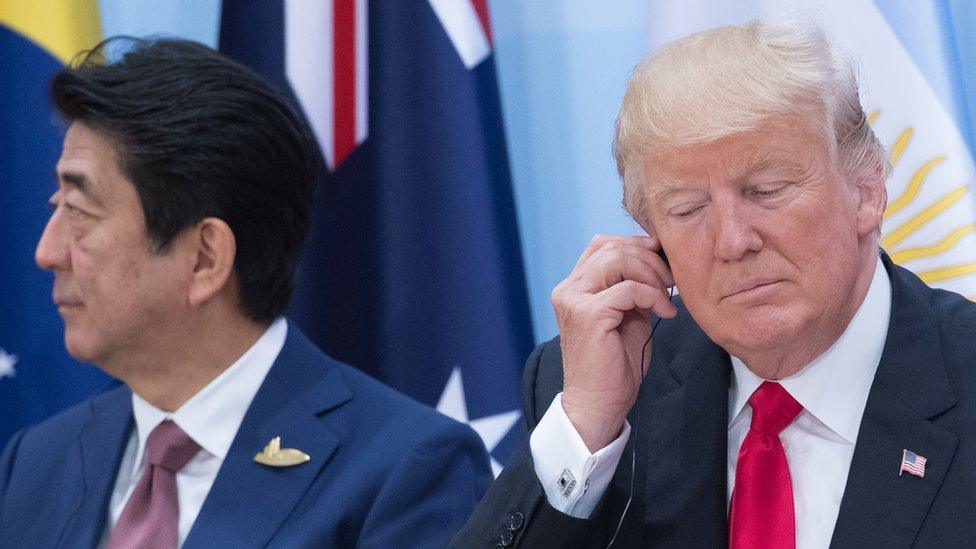'Triple whammy' threatens UN action on climate change
- Published
- comments

A "triple whammy" of events threatens to hamper efforts to tackle climate change say UN delegates.
At a meeting in Bonn, Saudi Arabia has continued to object to a key IPCC scientific report that urges drastic cuts in carbon emissions.
Added to that, the EU has so far failed to agree to a long term net zero emissions target.
Thirdly, a draft text from the G20 summit in Japan later this week waters down commitments to tackle warming.
One attendee in Bonn said that, taken together, the moves represented a fierce backlash from countries with strong fossil fuel interests.
There was controversy last December at the Katowice COP24 meeting in Poland, when Saudi Arabia, the US, Kuwait and Russia objected to moves to welcome the findings of the IPCC Special Report on 1.5C.
That study, regarded as a landmark, had two clear messages.
It showed that there were huge benefits in keeping temperature rises this century to 1.5C compared to a world that warmed 2C or more.
It also said that keeping the world below 1.5C was still possible, if drastic cuts in emissions were initiated by 2030.
To the frustration of a huge majority of countries, the objections of the four major fossil fuel producers, meant that the scientific report was not formally recognised in the negotiations.

During intense discussions about the IPCC, some delegates sat on the floor
The battle over the 1.5C report has carried over from Katowice to Bonn. Normally, this mid-year meeting is concerned with technical questions but this time the issue of the IPCC has re-emerged as a huge fault line between nations.
The Saudis are keen to highlight what are termed "knowledge gaps" in the IPCC report, that they believe hamper its ability to inform decision making at national or international level.
"We know that there are some hardliners that would try to downplay the seriousness and the actions that are required, that is their point of view," said Carlos Fuller from Belize, the lead negotiator for the Alliance of Small Island States.
"They recognise that they need to undertake major changes that they are not happy about."
How young people feel about effects of pollution and climate change
Many environmental campaigners see the Saudi pressure on the IPCC as part of campaign to discredit the science.
"The report shows the importance of striving towards 1.5C, that it is still achievable, and there is an incredible urgency to act vigorously and quickly," said Dr Jeni Miller from the Global Climate and Health Alliance.
"This report was requested by the UN, by these countries themselves, so to not accept the findings of the report is a rejection of science, and if you are rejecting the science there is not a way forward to address this problem."

Climate protestors have sought to bring their message to major events including a speech at the Mansion House by Chancellor Philip Hammond
While delegates seek to find a way forward on the science, there is growing concern about the European Union's inability to reach consensus on cutting carbon emissions to net zero by 2050.
Despite the late support of Germany in favour of the idea, four countries including Poland, Hungary, Czech Republic and Estonia, refused to support the plan last week.
This has caused some dismay among officials at the UN.
The Secretary General, António Guterres, has called a special summit on climate change to be held in New York in September, external with the express purpose of getting countries to increase their existing targets.
The EU's proposed net zero goal was key to making this a success.
Mr Guterres has expressed his "personal concern" about the setback. Campaigners are also worried.
"The EU are very aware of the Secretary General's summit, they are aware they are calling for a revision of targets, it would be embarrassing for the EU to go with what they just have now," said Ulriikka Aarnio, from the Climate Action Network.
"Somebody said they would be going from leader to loser if that was the case."
Do you have a question you want to ask about the planet? Try our climate change chatbot.
Contributing to the downbeat mood in Bonn is the forthcoming G20 meeting of global leaders in Osaka, Japan.
A draft of the closing communiqué mentions climate change as just one issue among many and omits to use the phrases "global warming" and "decarbonisation".
Critics believe that Japan is trying hard to win favour with the US on trade issues by downplaying the scale of the climate question and possible solutions to it.

Japan is said to be keen to curry favour with the US by downplaying climate issues at the upcoming G20 in Osaka
"The story, based on a draft of the communiqué, shows Prime Minister Shinzo Abe is a weak host and his G20 climate promises are full of hot air, undermining his previous claims that he seeks to save the planet." said Kimiko Hirata, director of the Kiko Network Japan, a non-governmental organisation.
"Japan, alongside China, is the biggest financier of coal overseas in the world and the government continues to build new coal plants domestically despite our huge solar and wind power potential."
As well as Japan, other leading economies are continuing to support coal based power generation. A study released by the Overseas Development Institute, external says that G20 nations have almost tripled the subsidies given to coal fired plants in recent years, despite the growing need to cut emissions.
Follow Matt on Twitter., external